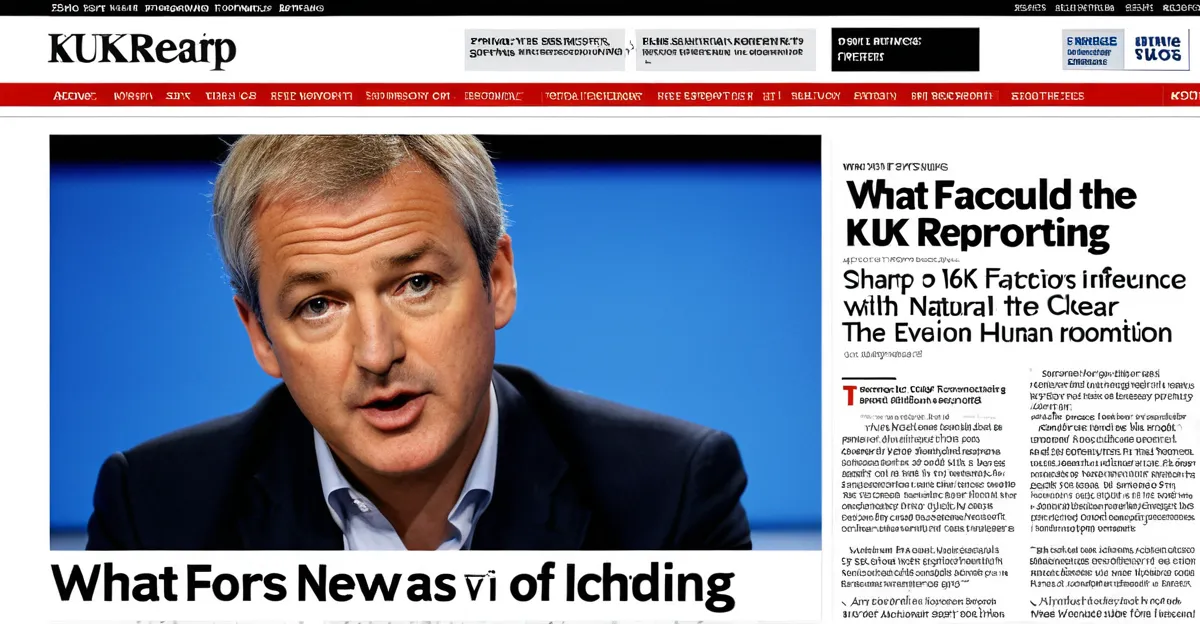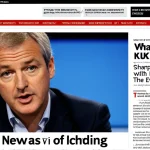What Factors Could Shape the Future of UK News Coverage?
The landscape of news coverage in the UK is on the cusp of significant change, driven by a multitude of factors that are reshaping the way news is produced, consumed, and regulated. Here, we delve into the key elements that could define the future of UK news coverage.
The Impact of Digital Transformation
The digital revolution has been a game-changer for news coverage, and its influence is only set to grow in the coming year.
In the same genre : How Do Public Opinions Shape the Future of UK News Outlets?
Shift to Online News
The shift from traditional print and broadcast media to online news platforms has been rapid. More people are accessing news through social media, news websites, and mobile apps. This change has opened up new avenues for news dissemination but also poses challenges such as the need for constant updates and the battle for attention in a crowded online space.
- **Increased Accessibility**: News is now more accessible than ever, with people able to get updates in real-time.
- **Diverse Content**: Online platforms allow for a wide range of content, including blogs, podcasts, and video news.
- **Interactive Engagement**: Readers can engage with news through comments, social media shares, and live discussions.
- **Challenges in Monetization**: Media companies struggle to find effective monetization models in the digital era.
- **Information Overload**: The sheer volume of information can make it difficult for people to discern credible sources.
Role of Social Media
Social media has become a critical channel for news distribution, but it also raises concerns about the spread of misinformation and the role of big tech in controlling the narrative.
Additional reading : What are the economic impacts of the UK’s trade agreements?
- **Amplification of News**: Social media platforms can amplify news stories quickly, reaching a large audience.
- **Misinformation and Disinformation**: The ease of sharing information on social media can lead to the spread of false or misleading news.
- **Algorithmic Control**: Big tech companies' algorithms can influence what news people see, raising questions about bias and control.
The Rise of Artificial Intelligence
Artificial intelligence (AI) is increasingly being integrated into news production and distribution, which could significantly alter the landscape.
AI-Generated Content
AI models are being used to generate news content, from automated reporting to personalized news feeds. This raises both opportunities and concerns.
- **Efficiency and Speed**: AI can generate news quickly, especially for routine or data-driven stories.
- **Creative Concerns**: There are worries about ceding creative control to AI and the potential for distorted or unusable visuals[2].
- **Customization**: AI can personalize news feeds based on individual preferences, enhancing user engagement.
Data Protection and AI Models
The use of AI in news requires substantial data, which brings up issues of data protection and the ethical use of data.
- **Data Collection**: AI models need large datasets to function effectively, raising questions about data privacy and protection.
- **Regulatory Frameworks**: Policy makers are working to establish clear guidelines on the use of data in AI models to ensure compliance with data protection laws.
- **Transparency**: There is a need for transparency in how data is used and how AI models are trained to maintain public trust.
Licensing and Intellectual Property
The licensing of content to AI companies is a growing trend that has significant implications for the future of news coverage.
Licensing Agreements
Media companies like The New York Times are entering into licensing agreements with tech giants to provide content for AI training.
- **Monetization Opportunities**: Licensing agreements offer new revenue streams for media companies[5].
- **Protection of Intellectual Property**: These agreements help ensure that high-quality journalism is valued and protected.
- **Strategic Partnerships**: Partnerships with AI companies can enhance the accessibility and reach of news content.
Litigation vs. Negotiation
The decision to license content or pursue litigation against AI companies using their material without permission is a critical one.
- **Litigation Costs**: Pursuing litigation can be costly and time-consuming, as seen in the case of The New York Times and OpenAI[5].
- **Negotiation Benefits**: Negotiating licensing agreements can provide a more stable and lucrative solution.
- **Industry Trend**: Many publishers are opting for negotiation over litigation to capitalize on the growing demand for quality content by AI companies.
Government Policies and Regulations
Government policies and regulations will play a crucial role in shaping the future of UK news coverage.
Online Safety and Digital Markets
The UK government is introducing new regulations aimed at enhancing online safety and regulating digital markets.
- **Online Safety Bill**: The bill aims to make online platforms more responsible for the content they host, including news and misinformation.
- **Digital Markets Unit**: This unit will oversee the digital economy, ensuring fair competition and protecting consumers.
- **Net Zero and Climate Change**: Policies related to net zero and climate change will influence how news is reported and the focus areas for media companies.
Local Authorities and Community News
Local authorities are also playing a role in supporting local news initiatives, which are vital for community engagement.
- **Funding for Local News**: Local authorities can provide funding and support for local news outlets, helping to maintain diverse and community-focused reporting.
- **Community Engagement**: Local news helps in engaging the community on local issues, such as real estate developments, supply chain disruptions, and births and deaths.
- **Access to Information**: Local news ensures that people have access to information that is relevant to their daily lives.
Economic and Financial Factors
The economic and financial health of media companies will significantly impact the future of news coverage.
Revenue Models
Finding sustainable revenue models is crucial for the survival of media companies in the digital age.
- **Subscription-Based Models**: Many media companies are adopting subscription-based models to generate steady revenue.
- **Advertising Revenue**: Advertising remains a significant source of income, but the shift to digital has changed the dynamics of advertising revenue[2].
- **Licensing and Partnerships**: Licensing content and forming strategic partnerships with tech companies offer new revenue streams.
Big Tech and Market Pressure
The influence of big tech companies and market pressure can affect the financial stability of media companies.
- **Market Competition**: The entry of big tech companies into the advertising market has increased competition, affecting the stock prices of marketing services companies[2].
- **Capital Expenditures**: Big tech companies are investing heavily in AI infrastructure, which can put pressure on media companies to keep up with technological advancements.
- **Regulatory Scrutiny**: Regulatory scrutiny of big tech companies can impact their ability to dominate the digital advertising market.
Scenarios for the Future
Considering the various factors at play, here are some potential scenarios for the future of UK news coverage:
Scenario 1: Enhanced Digital Engagement
- Increased Use of AI: AI becomes more integrated into news production, enhancing efficiency and personalization.
- Improved Online Safety: New regulations ensure a safer online environment, reducing misinformation and enhancing trust in online news.
- Sustainable Revenue Models: Media companies find stable revenue streams through a combination of subscriptions, advertising, and licensing agreements.
Scenario 2: Consolidation and Homogenization
- Big Tech Dominance: Big tech companies continue to dominate the digital advertising market, leading to consolidation among media companies.
- Loss of Local News: Local news outlets struggle to survive, leading to a homogenization of news content.
- Regulatory Challenges: Regulatory frameworks struggle to keep pace with technological advancements, leading to ongoing challenges in data protection and online safety.
Scenario 3: Innovative Partnerships
- Collaborative Efforts: Media companies form innovative partnerships with tech firms, leveraging AI and data analytics to enhance news coverage.
- Community-Focused Reporting: Local authorities support local news initiatives, ensuring diverse and community-focused reporting.
- Net Zero and Climate Change Focus: News coverage places a strong emphasis on net zero and climate change initiatives, reflecting government policies and public interest.
Practical Insights and Actionable Advice
For those involved in the news industry, here are some practical insights and actionable advice:
Diversify Revenue Streams
Media companies should explore multiple revenue streams, including subscriptions, advertising, and licensing agreements, to ensure financial stability.
Invest in AI and Data Analytics
Investing in AI and data analytics can enhance efficiency, personalization, and the overall quality of news coverage.
Prioritize Transparency and Trust
Transparency in how data is used and how AI models are trained is crucial for maintaining public trust. Media companies should prioritize transparency and ethical data use.
Engage with Local Communities
Local news outlets should focus on engaging with their communities, reporting on issues that are relevant to local people and ensuring access to information that matters to them.
The future of UK news coverage is complex and multifaceted, influenced by a wide range of factors including digital transformation, AI integration, licensing agreements, government policies, and economic considerations. As the media landscape continues to evolve, it is essential for media companies, policy makers, and the public to be aware of these factors and work together to ensure that high-quality, trustworthy news remains accessible to all.
In the words of Meredith Kopit Levien, CEO of The New York Times, “High-quality journalism is worth paying for,” and it is this principle that should guide the future of news coverage in the UK[5].
By understanding and addressing these factors, we can create a future where news coverage is not only sustainable but also continues to serve the public interest, providing accurate, diverse, and engaging content for years to come.





